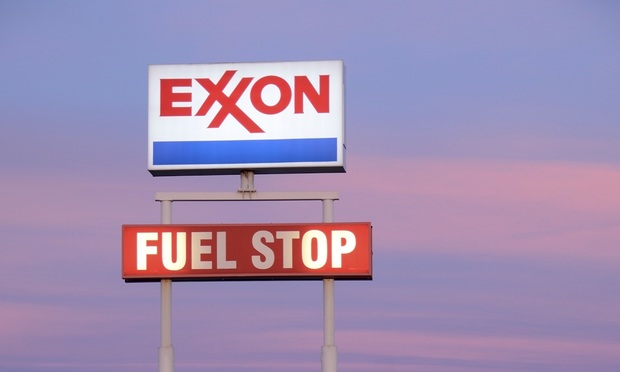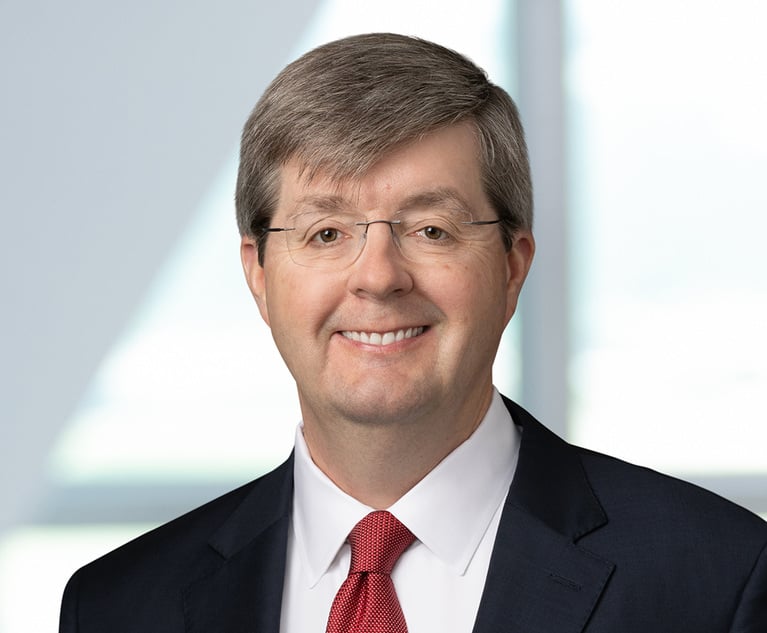Climate-Change 'Lawfare': Texas Judges Take Swipe at California's Liberal Courts, Reluctantly Ruling Against Exxon
"Lawfare is an ugly tool by which to seek the environmental policy changes the California parties desire, enlisting the judiciary to do the work that the other two branches of government cannot or will not do," said the opinion by the Second Court of Appeals in Texas.
June 19, 2020 at 11:53 AM
5 minute read
 Photo: River North Photography/iStockphoto.com.
Photo: River North Photography/iStockphoto.com.
Justices on Fort Worth's Second Court of Appeals in a recent ruling called climate-change litigation against Exxon Mobil Corp. "lawfare" and lamented that California courts hearing the lawsuits may join the "battlefield" when conservative Texas courts would not.
In the case, Exxon was litigating to obtain pre-lawsuit depositions to see if California litigation against it regarding climate change was brought in bad faith, just to try to suppress the company's speech on climate change.
Exxon's allegations and deposition request targeted a Massachusetts-based climate change litigator, and a group of California cities, counties, and their in-house attorneys and officials.
'Enlisting the judiciary'
The Second Court's three-justice panel threw out Exxon's request to do the depositions because they found Texas courts don't have jurisdiction over the California parties, since none of their actions happened in the Lone Star State and they didn't significantly contact or target Texans.
Yet the final two pages of the 49-page majority ruling made it clear the justices really wanted to side with Exxon.
Justice Elizabeth Kerr, joined by Chief Justice Bonnie Sudderth and Justice J. Wade Birdwell, confessed to "an impulse to safeguard an industry that is vital to Texas's economic well-being," the opinion said.
"Lawfare is an ugly tool by which to seek the environmental policy changes the California parties desire, enlisting the judiciary to do the work that the other two branches of government cannot or will not do to persuade their constituents that anthropogenic climate change has been conclusively proved and must be remedied by crippling the energy industry," the opinion said.
Noting that the Second Court is very conservative and follows settled legal principles, the ruling cast some doubt about what the California courts in the climate-change litigation might do.
"California courts might well be philosophically inclined to join the lawfare battlefield in ways far different than Texas courts," the ruling said.
At the highest levels of the nation's judiciary, U.S. Supreme Court Chief Justice John Roberts Jr. has frowned upon politicians who use partisan attacks to criticize judicial rulings. In public remarks he's said judges don't sit on opposite sides of the isle or serve one party or interest. He has said there are no "Obama judges or Trump judges, Bush judges or Clinton judges."
Read more: Thwarting Trump, Roberts Guards the Supreme Court's Reputation, and His
Strategic attacks on Exxon?
Exxon might appeal the loss.
"The court recognized that municipalities suing energy companies over climate change are engaged in 'Lawfare,'" Exxon spokesman Casey Norton wrote in a statement. "We are reviewing the court's decision and are evaluating our appellate options."
The California cities involved in the dispute are San Francisco, Oakland, Imperial Beach and Santa Cruz, and the counties are San Mateo, Marin and Santa Cruz. The case also includes city and county attorneys, other government officials and two of the cities' outside counsel—climate change litigator Matthew Pawa of Hagens Berman Sobol Shapiro in Newton, Massachusetts.
McKool Smith Principal Robert Manley, who represented the cities, didn't immediately return an email seeking comment. The counties' attorney, Pete Marketos, partner in Reese Marketos in Dallas, didn't immediately return a call. Stanley Law Group President Marc Stanley of Dallas, who represents Pawa, declined comment.
Exxon alleged that Pawa in the past formulated a legal strategy to sue energy companies for creating a climate change, a public nuisance, and then communicated the strategy to states and cities that sued the company.
The California parties sued Exxon in California in 2017. The case alleged that fossil-fuel emissions caused global warming, rising sea-levels, coastal flooding, erosion and salt-water intrusion. They said Exxon knew its products caused the damage, yet continued to produce and sell them, the opinion said.
Exxon claimed that in bond offering statements, the California parties contradicted claims they had made in the lawsuits. That's why the energy company alleged the lawsuits were really trying to silence and delegitimize Exxon, the opinion said. Pawa's involvement was further evidence that the cases were brought for an improper purpose, claimed Exxon.
'Blessing and curse'
Arguments arose about the court's jurisdiction. Even though a Tarrant County trial court ruled that it did have jurisdiction to decide if Exxon could depose the parties, the Second Court reversed that decision.
But not because they wanted to do it.
"Being a conservative panel on a conservative intermediate court in a relatively conservative part of Texas is both blessing and curse: blessing, because we strive always to remember our oath to follow settled legal principles set out by higher courts," the opinion said. "Curse, because in this situation, at this time in history, we would very much like to follow our impulse instead."
In a concurring opinion, Sudderth wrote, "Doing one's job and abiding by rules is not always a comfortable path."
She urged the Texas Supreme Court to reexamine the jurisdictional precedent that caused the court to rule this way.
Read the full ruling:
NOT FOR REPRINT
© 2025 ALM Global, LLC, All Rights Reserved. Request academic re-use from www.copyright.com. All other uses, submit a request to [email protected]. For more information visit Asset & Logo Licensing.
You Might Like
View All
Eversheds Sutherland Adds Hunton Andrews Energy Lawyer With Cross-Border Experience
3 minute read
Ex-Marathon General Counsel Takes Legal Reins of Another Energy Company

Bracewell Adds Former Pioneer Natural Resources Lawyer to O&G, Energy Transition Practices
2 minute read
ExxonMobil Sues California AG Bonta, Environmental Groups for Advanced Recycling 'Smear Campaign'
Law Firms Mentioned
Trending Stories
- 1NY AG James Targets Crypto Fraud Which Allegedly Ensnared Victims With Fake Jobs
- 2The 'Motherhood Advantage' in Law: Time to Flip the Script
- 3Fenwick & West Shutters Decade-Old Shanghai Office
- 4Thompson Coe, 2 Lawyers, Hit by $1M+ Legal Mal Suit
- 5Regulatory Intelligence Platform Abstract Announces $4.8 Million in Seed Funding
Who Got The Work
Michael G. Bongiorno, Andrew Scott Dulberg and Elizabeth E. Driscoll from Wilmer Cutler Pickering Hale and Dorr have stepped in to represent Symbotic Inc., an A.I.-enabled technology platform that focuses on increasing supply chain efficiency, and other defendants in a pending shareholder derivative lawsuit. The case, filed Oct. 2 in Massachusetts District Court by the Brown Law Firm on behalf of Stephen Austen, accuses certain officers and directors of misleading investors in regard to Symbotic's potential for margin growth by failing to disclose that the company was not equipped to timely deploy its systems or manage expenses through project delays. The case, assigned to U.S. District Judge Nathaniel M. Gorton, is 1:24-cv-12522, Austen v. Cohen et al.
Who Got The Work
Edmund Polubinski and Marie Killmond of Davis Polk & Wardwell have entered appearances for data platform software development company MongoDB and other defendants in a pending shareholder derivative lawsuit. The action, filed Oct. 7 in New York Southern District Court by the Brown Law Firm, accuses the company's directors and/or officers of falsely expressing confidence in the company’s restructuring of its sales incentive plan and downplaying the severity of decreases in its upfront commitments. The case is 1:24-cv-07594, Roy v. Ittycheria et al.
Who Got The Work
Amy O. Bruchs and Kurt F. Ellison of Michael Best & Friedrich have entered appearances for Epic Systems Corp. in a pending employment discrimination lawsuit. The suit was filed Sept. 7 in Wisconsin Western District Court by Levine Eisberner LLC and Siri & Glimstad on behalf of a project manager who claims that he was wrongfully terminated after applying for a religious exemption to the defendant's COVID-19 vaccine mandate. The case, assigned to U.S. Magistrate Judge Anita Marie Boor, is 3:24-cv-00630, Secker, Nathan v. Epic Systems Corporation.
Who Got The Work
David X. Sullivan, Thomas J. Finn and Gregory A. Hall from McCarter & English have entered appearances for Sunrun Installation Services in a pending civil rights lawsuit. The complaint was filed Sept. 4 in Connecticut District Court by attorney Robert M. Berke on behalf of former employee George Edward Steins, who was arrested and charged with employing an unregistered home improvement salesperson. The complaint alleges that had Sunrun informed the Connecticut Department of Consumer Protection that the plaintiff's employment had ended in 2017 and that he no longer held Sunrun's home improvement contractor license, he would not have been hit with charges, which were dismissed in May 2024. The case, assigned to U.S. District Judge Jeffrey A. Meyer, is 3:24-cv-01423, Steins v. Sunrun, Inc. et al.
Who Got The Work
Greenberg Traurig shareholder Joshua L. Raskin has entered an appearance for boohoo.com UK Ltd. in a pending patent infringement lawsuit. The suit, filed Sept. 3 in Texas Eastern District Court by Rozier Hardt McDonough on behalf of Alto Dynamics, asserts five patents related to an online shopping platform. The case, assigned to U.S. District Judge Rodney Gilstrap, is 2:24-cv-00719, Alto Dynamics, LLC v. boohoo.com UK Limited.
Featured Firms
Law Offices of Gary Martin Hays & Associates, P.C.
(470) 294-1674
Law Offices of Mark E. Salomone
(857) 444-6468
Smith & Hassler
(713) 739-1250






